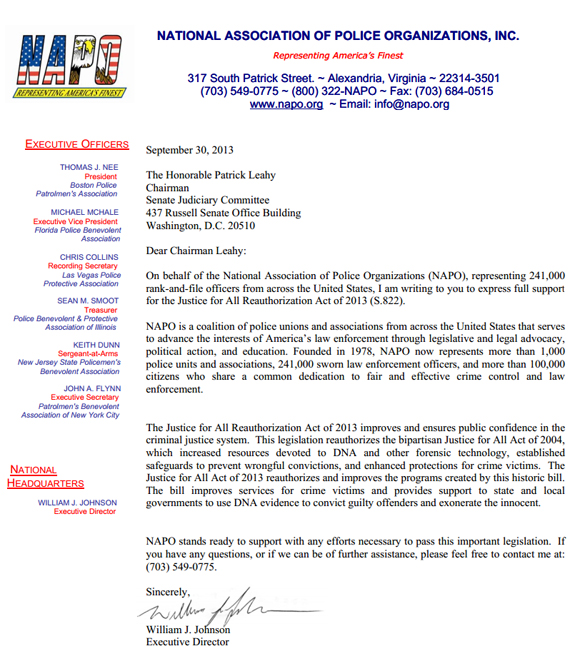
NAPO supports the Justice for All Reauthorization Act of 2013
September 30, 2013On September 30, 2013, NAPO sent the attached letter of support for the Justice for All Act of 2013 (S.822) to the bill’s sponsor, Senate Judiciary Chairman Patrick Leahy (S.822). The bipartisan Justice for All Act of 2004 increased resources devoted to DNA and other forensic technology, established safeguards to prevent wrongful convictions, and enhanced protections for crime victims. The Justice for All Reauthorization Act of 2013 reauthorizes and improves the programs created by this historic legislation, while remaining at current authorization levels. This reauthorization builds on the steps the Justice for All Act took to improve the criminal justice system and ensure public confidence in the system.
This reauthorization strengthens key rights for crime victims.
- Too often, victims are unaware of their rights and how to obtain services to which they are entitled. This bill establishes an affirmative right for crime victims to be informed of their rights as established in the Crime Victims’ Rights Act and other key laws.
- The bill makes it easier for crime victims to assert their legal rights in court and maintains funding for programs that notify victims of their rights and provide assistance.
The bill reauthorizes the Debbie Smith DNA Backlog Grant Program.
- The Justice for All Act created the Debbie Smith DNA Backlog Grant Program to reduce evidence backlogs in crime labs, particularly in sexual assault cases. This bill reauthorizes that important program to ensure that its success continues.
The bill improves access to post-conviction DNA testing to protect the innocent.
- The original Justice for All Act created the Kirk Bloodsworth Post Conviction DNA Testing Grant Program, which provides funding to states to test DNA evidence in serious criminal cases in which there was key DNA evidence that had never been tested. Post-conviction DNA testing strengthens our criminal justice system by helping to ensure that those who have been wrongly convicted are exonerated and the guilty are punished.
- This bill expands state access to post-conviction DNA testing funds by narrowing the evidence preservation requirement to serious felony cases, a more attainable goal for states.
- The bill allows federal post-conviction DNA testing even for people who waived their right to such testing, given that nineteen of the first 250 individuals exonerated by DNA evidence waived their rights and pleaded guilty despite their innocence. It also gives federal judges more flexibility to grant a new trial or sentence when exculpatory DNA evidence is discovered.
This reauthorization includes new measures to help ensure the effective administration of criminal justice in the states.
- The bill contains provisions to increase accountability for federal funds spent by state and local governments on criminal justice and to ensure that resources are distributed in ways that allow the justice system to operate effectively as a whole.
- The bill reinstates a previous requirement that states receiving funds under the Edward Byrne Memorial Justice Assistance Grant Program develop a strategic plan detailing how the funds will improve the administration of justice. It provides for input from all segments of the criminal justice system and assistance from the Justice Department to ensure the effective use of criminal justice resources.
- The legislation requires the Justice Department to assist states and local governments wanting help improving their system for providing indigent defense.
If you have any questions about this legislation, please contact Melissa Nee at: mnee@napo.org.
Source
United States. Senate Judiciary Committee. The Justice for All Reauthorization Act of 2013. 113th Cong. Cong S.822.
Print.
